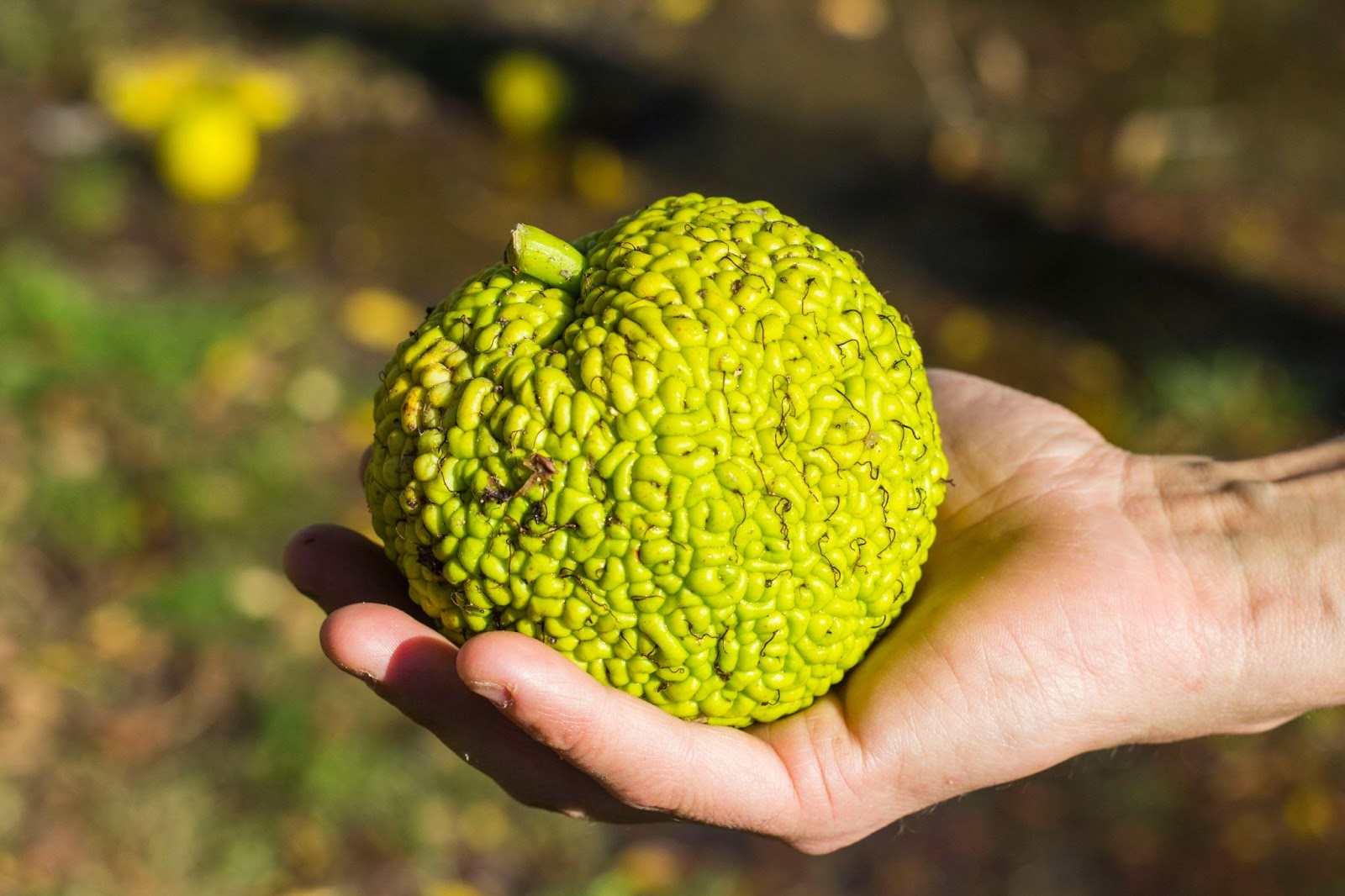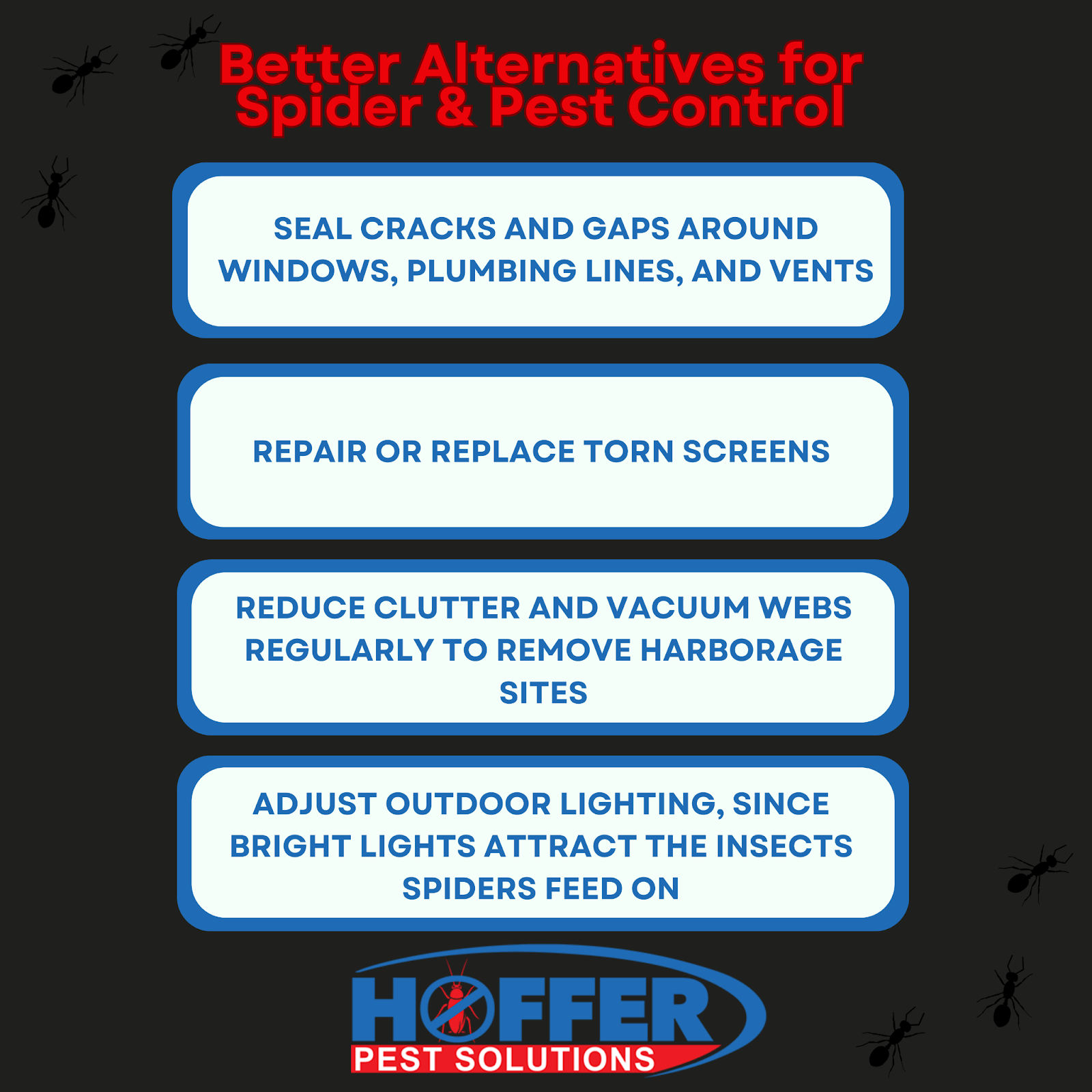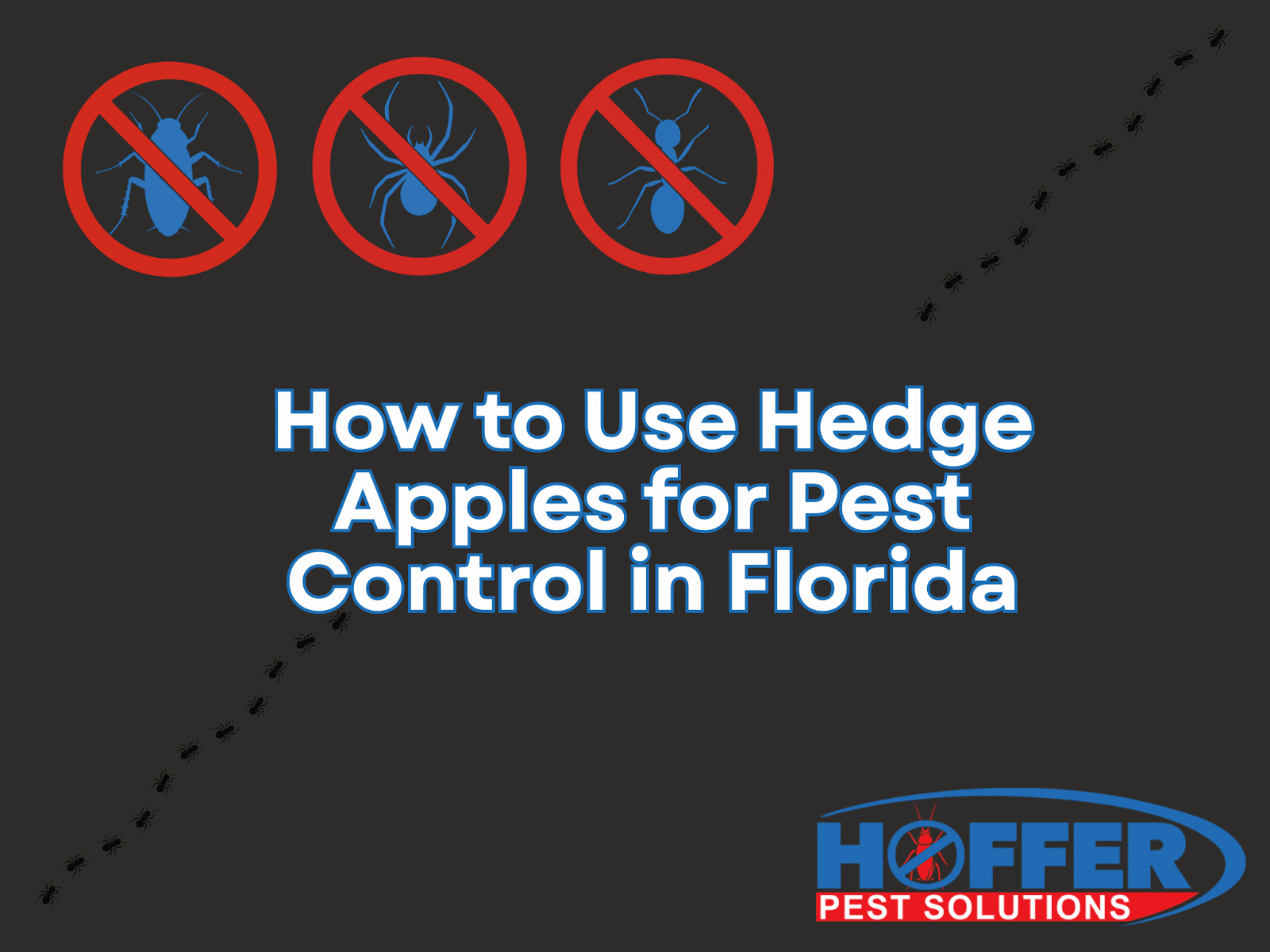Hedge apples have been passed down for generations as a “natural spider repellent.” Homeowners place the large, bumpy fruits near basements, windows, and entryways, believing their scent will drive pests away. But science shows the effect is short-lived at best, and in Florida, the fruit decays even faster in our heat and humidity.
If you’re considering this remedy, here’s what you need to know: hedge apples may offer mild deterrence, but they don’t solve the pest challenges Florida homeowners face. Spiders, ants, roaches, and termites require year-round solutions, not quick fixes that spoil in days.
That’s where professional support comes in. Hoffer Pest Solutions helped Florida families protect their homes for more than 40 years with proven treatments designed for our unique climate and pest pressures.
If you want the full breakdown, including what hedge apples can and can’t do, safer alternatives, and when it’s time to call in pest control, keep reading.
What Are Hedge Apples?

Hedge apples come from the Osage orange tree (Maclura pomifera), a species more common in the Midwest than in Florida. The tree produces large, wrinkled fruits about the size of a softball. Over the years, these fruits have collected a long list of nicknames: horse apples, monkey brains, bois d’arc, and mock oranges.
This variety of names has caused confusion, with some people mistakenly trying out the wrong fruit altogether. To make matters more complex, hedge apples aren’t actually native to Florida. They’re sometimes sold at roadside stands or brought down by residents who have family ties to regions where Osage oranges are more common.
Do Hedge Apples Repel Pests? The Science vs. Folklore
The belief that hedge apples repel spiders has been around for generations. At first glance, it makes sense, scientists have confirmed that compounds in Osage orange essential oil can repel certain insects in controlled lab settings. The problem is that this research doesn’t translate to the intact fruit sitting in your basement.
Whole hedge apples don’t release enough of those compounds into the air to provide lasting pest control. Some homeowners insist they’ve seen fewer spiders after placing the fruit indoors, while others notice no change at all. That variation is exactly why pros caution against treating hedge apples as a reliable solution.
So, does it work? At best, hedge apples may discourage new spider activity in a very small area for a very short period. They won’t eliminate existing populations, and they certainly won’t solve bigger pest problems like ants, roaches, or termites, the issues we most often deal with here in Florida.
Risks & Drawbacks of Hedge Apples
While the idea of a natural spider repellent sounds appealing, hedge apples come with a list of risks most homeowners don’t consider. The fruits ooze a milky sap that can irritate skin, and for those with latex sensitivity, handling them is especially problematic.
As they rot, hedge apples often attract more pests than they deter, fruit flies, gnats, and even ants. Curious kids might see the bright green fruit and try to taste it, which is dangerous since the raw seeds require processing to be safe. Pets and livestock can also be at risk; horses in particular have been known to choke on them if left in pastures.
What begins as a natural remedy can quickly become a health and safety hazard, especially in homes with children, pets, or allergy-sensitive family members.
Why Hedge Apples Fail Faster in Florida Homes
Even if hedge apples showed mild effects in cooler climates, Florida is a different story. Our warm, humid, and rainy weather accelerates fruit decay. Within days, hedge apples turn soft, moldy, and attract gnats, creating a bigger mess indoors than most homeowners bargained for.
Florida also has a year-round pest season. Unlike states where winter gives homeowners a break, ants, roaches, spiders, and termites are always active here. That means a short-lived folk remedy can’t keep up with the constant pressure of pests. Hedge apples are most often associated with spider control, but in South Florida, ants are actually the number one problem inside homes. Hedge apples simply don’t address the pests that matter most.
In many cases, placing hedge apples indoors can actually make pest issues worse by drawing in ants or flies as the fruit decomposes. For a state like ours, hedge apples are impractical. If you need help, contact Hoffer Pest Solutions.
Better Alternatives for Spider & Pest Control

If you’re looking for natural ways to discourage spiders and other pests, there are steps that deliver more predictable results than hedge apples. Start with the basics:
- Seal cracks and gaps around windows, plumbing lines, and vents.
- Repair or replace torn screens.
- Reduce clutter and vacuum webs regularly to remove harborage sites.
- Adjust outdoor lighting, since bright lights attract the insects spiders feed on.
Some homeowners also use peppermint oil sprays or sticky traps, which can provide a short-term reduction in spider activity without the mess of rotting fruit.
Professional spider control includes web sweeping, targeted perimeter treatments, and follow-up visits to ensure spiders don’t regain a foothold. That’s where a service plan designed for Florida homes provides peace of mind.
Why Florida Residents Trust Hoffer Pest Solutions

Spiders, ghost ants, pharaoh ants, German cockroaches, termites, and mosquitoes thrive here year-round, and hedge apples do nothing to deter them. In our climate, pest control is as necessary and ongoing as air conditioning.
That’s where Hoffer Pest Solutions comes in. We offer same-day service when you call before noon, so you never have to wait long for relief. Our Home Shield programs are built for the state’s toughest pest challenges:
- Home Shield Classic protects against 20+ common pests, including spiders and ants.
- Home Shield Advantage adds protection against termites.
- Home Shield Complete expands coverage to mosquitoes, fleas, and fire ants.
As a family-owned, second-generation business rooted in this community, we’ve spent more than 40 years helping Florida neighbors protect their homes. Our services come with a simple promise: if pests come back, so do we, at no extra charge.
Our technicians understand Florida pests better than anyone, because this is our home too. We design treatment plans that target the problems you’re actually facing, from spider webs in the eaves to ghost ants in the kitchen. With guaranteed service and long-term prevention, we don’t just eliminate pests, we give families the peace of mind they deserve. Protecting homes, memories, and the people inside them is our responsibility.
Ready for protection beyond old folk remedies? Schedule your inspection with Hoffer Pest Solutions today and enjoy a pest-free home with confidence.
Should You Use Hedge Apples for Pest Control?
Hedge apples may look unusual and make for a fun story, but in practice they’re more decorative than effective. At best, they offer a mild and temporary spider deterrent. In Florida, the risks of mold, mess, and safety hazards far outweigh the potential benefits.
For results, you need a solution built for the climate and pest pressures of South Florida. That’s why homeowners across the region rely on Hoffer Pest Solutions. We’re your neighbors, here to protect your home year-round.
Don’t wait for pests to take over, call Hoffer Pest Solutions today and get same-day relief backed by a local team you can trust. Protect your home, your family, and your peace of mind with proven pest control that works.
Frequently Asked Questions (FAQ)
Do hedge apples repel mice or other rodents?
Despite the folklore, there’s no scientific proof that hedge apples repel mice, rats, or other rodents. In Florida, rodent issues are best handled with exclusion work, sealing entry points and using traps or bait systems as needed.
Can hedge apples be stored for later use?
Some people freeze hedge apples to extend shelf life, but once thawed they break down quickly. In Florida’s climate, they rot faster, making storage impractical.
Are hedge apples safe to compost?
Yes, hedge apples can be composted, but the sticky latex sap may cause clumping. If composting, chop them into smaller pieces and mix well with dry yard waste to help them break down.
What’s the wood of the Osage orange tree used for?
Osage orange wood is extremely dense and was historically used for bow making, fence posts, and even dyes. It’s prized for durability, but this utility doesn’t extend to pest control inside your home.
Are there better natural repellents for spiders in Florida homes?
Yes. Peppermint oil sprays, vinegar solutions, and sticky traps are common natural options. That said, none provide lasting protection. Combining these with professional spider control, like web removal and perimeter treatments, is far more effective.


